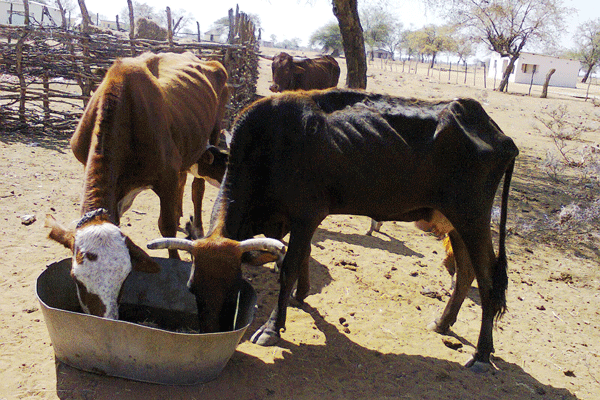
MATABELELAND South farmers have started losing livestock due to lack of water and shortage of pastures.
BY MTHANDAZO NYONI
The region is ravaged by drought following poor rainfall experienced in the last agricultural season.
Last season, Zimbabwe experienced an El Niño-induced dry spell, characterised by extremely hot and dry weather conditions, which left people and livestock in dire straits.
A visit by the Standardbusiness in the province last week revealed that farmers in areas such as Gwaranyemba and Wenlock were battling to keep their livestock in good health due to the shortage of water and grazing areas.
Most water sources in the province have dried up, leaving humans and livestock to share the few water sources that remain.
So dire is the situation that villagers have resorted to digging wells in dry river beds to find water for themselves and their livestock.
Standardbusiness caught up with two traditional leaders —chiefs Nhlamba and Mathema —who said the situation was dire and their areas were in need of urgent intervention.
- Chamisa under fire over US$120K donation
- Mavhunga puts DeMbare into Chibuku quarterfinals
- Pension funds bet on Cabora Bassa oilfields
- Councils defy govt fire tender directive
Keep Reading
“We have a serious water shortage here and our livestock has started dying,” said Chief Nhlamba.
“We don’t have enough dams and the ones we have usually dry up quickly. To mitigate the challenge, villagers have resorted to fetching water for their livestock from the wells they would have dug in the rivers.”
Although he could not readily provide statistics of how many cattle had died so far, Nhlamba described the situation as worrisome to villagers who use cattle as their source of livelihood.
According to reports, 450 cattle have died in Matabeleland South since late last year amid estimates that more than 350 000 animals face starvation if no intervention comes.
In 2012, the province lost more than 9 000 cattle to drought.
Villagers are now selling off their cattle at give-away prices to avoid losses, with a beast now being sold at between $100 and $250 against the normal average price of around $500.
Chief Mathema said the issue of water had always been a challenge for farmers.
Mathema said the situation, especially in Wenlock, was worsened by illegal settlers who had invaded their area, disrupting farming activities.
“These settlers have taken over our grazing land and water bodies. If we want to access them, they tell us many stories,” Mathema said.
Chief Nhlamba said they needed more dams to harvest water for their livestock.
The poor farmers cannot afford to buy feeding supplements for their livestock. Those with some cash have taken their livestock for feeding in big plots within the area. But the majority do not have money and have had to watch their cattle die.
“We are struggling to keep our livestock alive due to acute water shortages and inadequate pastures,” said one farmer who identified himself as Nkosilathi Ndebele.
A bag of stockfeed costs around $15 in Gwanda town and not many farmers can afford to buy it.
Matabeleland South livestock specialist, Hatitye Muchemwa, confirmed the situation in the province, saying it was critical.
“The situation is deteriorating as water bodies and grazing have depleted. Livestock are relying on boreholes but the challenge we are having now is that the water table has gone down. So now it’s a challenge to access water from boreholes,” Muchemwa said.
Muchemwa said the other issue was that some of their cattle were straying into Botswana in search of pastures and were being shot dead by authorities there.
Matabeleland South and other provinces like Midlands and Masvingo have over the years lost thousands of cattle due to drought, caused by poor rains.
In his mid-term fiscal review statement, Finance minister Patrick Chinamasa said the national cattle herd stood at 5,5 million, up from 5,47 million in 2014/15.
He said the European Union was supporting smallholder livestock breeders through the rehabilitation of infrastructure which included 50 dip tanks, seven feedlots and 131 boreholes in Nkayi and Lupane districts, benefitting 40 000 households.
The bloc was also supporting the livestock value chain with the development of formalised markets as well as animal health and disease control, Chinamasa said.











